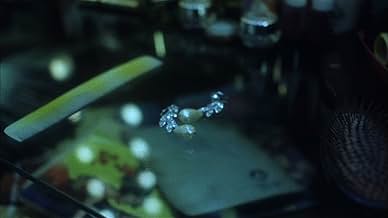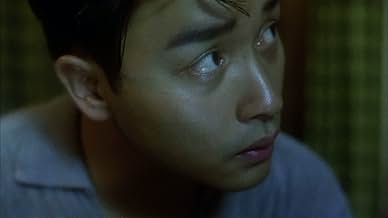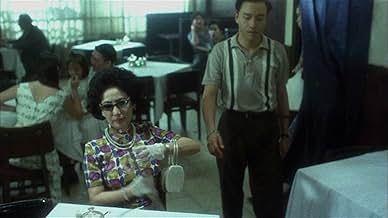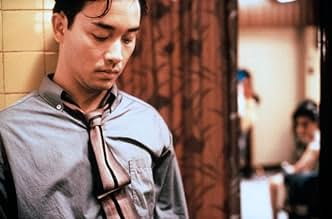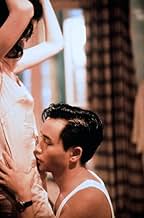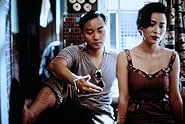A man tries to find out who his real mother is after the woman who raised him tells him the truth.A man tries to find out who his real mother is after the woman who raised him tells him the truth.A man tries to find out who his real mother is after the woman who raised him tells him the truth.
- Awards
- 17 wins & 9 nominations total
Rebecca Pan
- Rebecca
- (as Tik-Wa Poon)
Tony Leung Chiu-wai
- Chow Mo-wan
- (as Tony Chiu Wai Leung)
- Director
- Writers
- All cast & crew
- Production, box office & more at IMDbPro
Featured reviews
I guess the main reason that this is my favorite WKW movie is that it's one of the least abstract of his movies and I feel like the viewer becomes more emotionally involved with the characters because of that. The music, as always with WKW, is wonderful and the cinematography is fine, I especially like all the shots of the lush tropical forests. It isn't as beautifully photographed as many of his later films like chungking express and in the mood for love. And it doesn't feature much of the fancy techniques that WKW likes to employ in movies like fallen angels or happy together. Still I think this is my favorite of Wong Kar Wai's movies, not necessarily the best, but the one I enjoy the most. Highly Recommended.
Many people here seem to be of the opinion that this film is not very typical of Wong's work. I would like to disagree. To me, this film is a very typical Wong film. That is, if you are expecting the absolutely perfect colours, pictures and frames of 'In the Mood for Love', you will be disappointed. This film, like many of his other films, has a more rough quality to it.
All you who have seen 'In the Mood' and liked it should really see this film, as I don't think you can understand 'In the Mood' without having seen this one. I was not particularly overwhelmed by 'In the Mood', but now that I have seen this film, I at least understand the later film better. So maybe also those who did not like 'In the Mood' should see this one, as it might change their perception of that film.
To me Wong Kar-Wai's best film is still Chungking Express. And this film, although kind of in line with that film, does not reach up to that standard. I am glad I saw this film, as it explains other parts of Wong's work to me, but were it not for the sake of understanding that bigger picture, I don't think I would recommend it.
All you who have seen 'In the Mood' and liked it should really see this film, as I don't think you can understand 'In the Mood' without having seen this one. I was not particularly overwhelmed by 'In the Mood', but now that I have seen this film, I at least understand the later film better. So maybe also those who did not like 'In the Mood' should see this one, as it might change their perception of that film.
To me Wong Kar-Wai's best film is still Chungking Express. And this film, although kind of in line with that film, does not reach up to that standard. I am glad I saw this film, as it explains other parts of Wong's work to me, but were it not for the sake of understanding that bigger picture, I don't think I would recommend it.
In Wong Kar-wai's 1991 film Days of Being Wild, Yuddy (Leslie Cheung), a charming drifter captures the attention of store attendant Su Lizhen (Maggie Cheung) by asking her to look at his watch. When she sees that it says one minute before 3:00PM on April 16, 1960, he tells her that she will never forget the moment and will dream about him that night. The next time they meet, the moment becomes two, then one hour, then weeks and months but Yuddy is like the mythical bird with no legs that just flies and flies and never lands. Abandoned by his real mother and brought up by a wealthy alcoholic courtesan (Rebecca Pan), he does not know where he came from or where he is going. He treats women with little respect, discarding them when they no longer serve his purpose. When one lover asks him if he loves her, he tells her that during his life he will be friends with many, many women but won't know whom he truly loves until the end.
Days of Being Wild unfolds like a dream with color filters, unusual shadows, and the sights and sounds of Hong Kong's rainy nights and sweltering summers. Based on the director's memories from his childhood and admiration for the style of Argentinean novelist Manuel Puig (Heartbreak Tango), the film is a series of episodes involving six people who touch each other's lives. After his short-lived relationship with Su, Yuddy meets a cabaret dancer who calls herself Mimi (Carina Lau) but their relationship fares no better and she is left to suffer the consequences of their breakup. Meanwhile, Su meets Tide (Andy Lau), a gentle policeman whom she is able to confide until he suddenly leaves Hong Kong to become a sailor. Each character seeks a sense of identity and fulfillment. After Rebecca tells him of her plans to move to America with her boyfriend, she finally lets him know who and where his real mother is. After Yuddy goes to the Philippines to try to find his mother, the lives of the main protagonists come together in a powerful conclusion.
Days of Being Wild may sound like a soap opera but the film reaches a much higher artistic level. Supported by outstanding performances by Leslie Cheung, Maggie Cheung, and Jacky Cheung as Yuddy's only friend Zeb, it is a tone poem about longing and one's search for identity. We care about the characters even though they don't seem to care about themselves. Like many of us, they pine for the things that might have been, the word that was never said, and the love that remains elusive. A commercial failure but an artistic triumph, Days of Being Wild is a moody, atmospheric film that with its background of popular music, in this case 1950's rumbas and cha-cha's, forecasts the director's later In the Mood For Love. As a beautifully realized example of alienated people desperately seeking their place in the world, however, it stands securely on its own.
Days of Being Wild unfolds like a dream with color filters, unusual shadows, and the sights and sounds of Hong Kong's rainy nights and sweltering summers. Based on the director's memories from his childhood and admiration for the style of Argentinean novelist Manuel Puig (Heartbreak Tango), the film is a series of episodes involving six people who touch each other's lives. After his short-lived relationship with Su, Yuddy meets a cabaret dancer who calls herself Mimi (Carina Lau) but their relationship fares no better and she is left to suffer the consequences of their breakup. Meanwhile, Su meets Tide (Andy Lau), a gentle policeman whom she is able to confide until he suddenly leaves Hong Kong to become a sailor. Each character seeks a sense of identity and fulfillment. After Rebecca tells him of her plans to move to America with her boyfriend, she finally lets him know who and where his real mother is. After Yuddy goes to the Philippines to try to find his mother, the lives of the main protagonists come together in a powerful conclusion.
Days of Being Wild may sound like a soap opera but the film reaches a much higher artistic level. Supported by outstanding performances by Leslie Cheung, Maggie Cheung, and Jacky Cheung as Yuddy's only friend Zeb, it is a tone poem about longing and one's search for identity. We care about the characters even though they don't seem to care about themselves. Like many of us, they pine for the things that might have been, the word that was never said, and the love that remains elusive. A commercial failure but an artistic triumph, Days of Being Wild is a moody, atmospheric film that with its background of popular music, in this case 1950's rumbas and cha-cha's, forecasts the director's later In the Mood For Love. As a beautifully realized example of alienated people desperately seeking their place in the world, however, it stands securely on its own.
Though it has been argued that 'A Fei Zheng Chuan' (aka 'Days of Being Wild') is the first set of the trilogy which is completed by 'Fa Yeung Nin Wa' (aka 'In the Mood For Love') and '2046', it 'looks' different from the other two films. Kar Wai uses less colour, more shadow, rain and heat and more rawness. The tone is much darker than in 'Fa Yeung Nin Wa' as the film is set in the 50s. The music is beautiful and effectively used. And, here too Kar Wai ends up making a powerful product. Though this film was a box office failure, it is an artistic victory.
'A Fei Zheng Chuan' tells the story of 6 individuals whose lives are interconnected by each character's search and struggle for an identity. It's about loneliness, unrequited love, lost love, the search for love, and how the search continues. Kar Wai clevely brings up the theme of sex (without showing any nudity). The writing is excellent and the characterization is strengthened by superb and unique performances. The late Leslie Cheung's Yuddy is not a very likable person but we do sympathize with this man and recognize him. Maggie Cheung as Su gives one of the most subtle and finest performances. Carina Lau is energetic and terrific as Mimi. Rebecca Pan gracefully downplays her part. Andy Lau's Tide and Jacky Cheung's Zeb too are relatable and the actors are nothing short of remarkable. Actually, I recognize all the characters in this film.
I loved the cinematography, especially the long shots. One of my favorite shot is the introduction of the scene that glides from the Phillipine streets to Yuddy and Tide in a lunch bar. This is one fine example of skillful camera-work. The shaky camera (which thankfully isn't overdone) and the close-ups that mostly take place during conversations and intimate moments between two characters work very well. Doyle's camera-work simply guides us through the lives of these characters.
Summing it up, 'A Fei Zheng Chuan' works on many levels. It is an excellent study of characters, it 'tells' a universal story in a poetic way and it is a fine cinematic experience.
A bird that never lands will one day suddenly seize to exist.
'A Fei Zheng Chuan' tells the story of 6 individuals whose lives are interconnected by each character's search and struggle for an identity. It's about loneliness, unrequited love, lost love, the search for love, and how the search continues. Kar Wai clevely brings up the theme of sex (without showing any nudity). The writing is excellent and the characterization is strengthened by superb and unique performances. The late Leslie Cheung's Yuddy is not a very likable person but we do sympathize with this man and recognize him. Maggie Cheung as Su gives one of the most subtle and finest performances. Carina Lau is energetic and terrific as Mimi. Rebecca Pan gracefully downplays her part. Andy Lau's Tide and Jacky Cheung's Zeb too are relatable and the actors are nothing short of remarkable. Actually, I recognize all the characters in this film.
I loved the cinematography, especially the long shots. One of my favorite shot is the introduction of the scene that glides from the Phillipine streets to Yuddy and Tide in a lunch bar. This is one fine example of skillful camera-work. The shaky camera (which thankfully isn't overdone) and the close-ups that mostly take place during conversations and intimate moments between two characters work very well. Doyle's camera-work simply guides us through the lives of these characters.
Summing it up, 'A Fei Zheng Chuan' works on many levels. It is an excellent study of characters, it 'tells' a universal story in a poetic way and it is a fine cinematic experience.
A bird that never lands will one day suddenly seize to exist.
Kar Wai Wong's 2nd feature film is considerably more abstract than his first "As Tears Go By". so if you're looking for a good first Kar Wai Wong film to watch, you should probably start there.
"Days of Being Wild" reminded me very much of the classic French book "The Stranger" by Albert Camus; in fact I wonder if Kar Wai Wong may have been influenced by that book. Both stories center around a young man who is very unemotional except at times of explosive violence. Both stories show the young man to have severe mommy issues, i.e. a disconnection from his mother resulting in never learning how to show love and caring. And in both stories, the main character follows a very existentialistic path in life. He goes wherever life may take him with no connection to people or places.
The main character is not very likable. In fact he's a downright jerk toward women. But this ties in with the story of him trying to find his mother who abandoned him when he was a child. At the same time we see the interweaving of 4 other characters: 2 girlfriends, 1 devoted friend who falls for one of the girlfriends, and a policeman who enters the story by chance. Oh yeah, there's also the young man's rich aunt (adoptive mother) and a string of men she keeps.
It may be tough keeping up with all the characters, especially when the story starts moving to different locations. Certain events may seem random, but in the end it all comes together with a very poetic thought.
If you're a cinema geek, you'll love this film for its sheer technical achievements. A lot of scenes are shot with reflections & mirrors, allowing us to see the faces of different people simultaneously (without the camera jumping back & forth to whoever is talking). For example, the camera may be on a woman while she talks to a man. He is in front of the camera with his back to us, but we see his face & expressions in the reflection of a bathroom mirror behind the woman. Yea, I'm a cinema geek so I love stuff like that. If you like little details, you'll have a great time watching "Days of Being Wild".
"Days of Being Wild" reminded me very much of the classic French book "The Stranger" by Albert Camus; in fact I wonder if Kar Wai Wong may have been influenced by that book. Both stories center around a young man who is very unemotional except at times of explosive violence. Both stories show the young man to have severe mommy issues, i.e. a disconnection from his mother resulting in never learning how to show love and caring. And in both stories, the main character follows a very existentialistic path in life. He goes wherever life may take him with no connection to people or places.
The main character is not very likable. In fact he's a downright jerk toward women. But this ties in with the story of him trying to find his mother who abandoned him when he was a child. At the same time we see the interweaving of 4 other characters: 2 girlfriends, 1 devoted friend who falls for one of the girlfriends, and a policeman who enters the story by chance. Oh yeah, there's also the young man's rich aunt (adoptive mother) and a string of men she keeps.
It may be tough keeping up with all the characters, especially when the story starts moving to different locations. Certain events may seem random, but in the end it all comes together with a very poetic thought.
If you're a cinema geek, you'll love this film for its sheer technical achievements. A lot of scenes are shot with reflections & mirrors, allowing us to see the faces of different people simultaneously (without the camera jumping back & forth to whoever is talking). For example, the camera may be on a woman while she talks to a man. He is in front of the camera with his back to us, but we see his face & expressions in the reflection of a bathroom mirror behind the woman. Yea, I'm a cinema geek so I love stuff like that. If you like little details, you'll have a great time watching "Days of Being Wild".
Did you know
- TriviaThe film was supposed to be the first part of a project. But due to its relatively poor performance at the box office when it was first released, the producers decided not to finish the second part. The nameless character that appears in the last scene played by Tony Leung Chiu-wai is supposedly the main character in the second part.
- GoofsWhen Tide checks into the hotel, the hotel manageress hands him the key to Room 206. However, in the next scene, Tide uses the key to enter Room 204. This, however, may not be so much a 'goof' as another recurrence of the number '2046' seen so often in Wong Kar-Wai's films.
- Alternate versionsA different 35mm print of the film features an altered prologue sequence and different edits during the final scenes of the film. This version decreases the length of the film from 95 to 94 minutes.
- ConnectionsFeatured in Still Love You After All These (1997)
- SoundtracksJungle Drums (Cantonese cover)
Music by Ernesto Lecuona & J. Cacabas
Lyrics by Sharon Chung
Performed by Anita Mui
- How long is Days of Being Wild?Powered by Alexa
Details
- Release date
- Country of origin
- Official site
- Languages
- Also known as
- The True Story of a Hoodlum
- Filming locations
- Production company
- See more company credits at IMDbPro
Box office
- Gross US & Canada
- $146,310
- Opening weekend US & Canada
- $18,090
- Nov 21, 2004
- Gross worldwide
- $3,257,906
- Runtime1 hour 34 minutes
- Color
- Aspect ratio
- 1.85 : 1
Contribute to this page
Suggest an edit or add missing content



